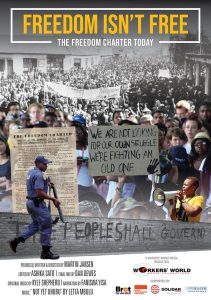“Freedom Isn’t Free – The Freedom Charter Today” : Anniversary screenings
Sixty-three years ago on 26 June 1955, the Freedom Charter was signed by the Congress movement as a statement of its ideals and objectives for liberation. To mark this occasion, Workers' World Media Productions is screening our new documentary, Freedom Isn't Free - The Freedom Charter Today.
| JOHANNESBURG | CAPE TOWN |
| Tuesday: 26 June Time: 5h30 pm Venue: Human Rights conference room, Constitution Hill, Johannesburg | Thursday: 28 June Time: 6 - 8 pm Venue: Bertha auditorium, Isivivana Centre 8 Mzala Road, Khayelitsha |
Admission is free.

Synopsis from 2018 Encounters International Film Festival
Freedom Isn’t Free challenges the ANC government with its failure to bring into being the words and resolutions of the Freedom Charter signed at Kliptown in 1955 when, from all over the country, Congress of the People delegates assembled to forge a new path for South Africa. Using excellent archival footage, intercut from that past into the present and informative commentary by new and older generations, the film demonstrates that for the overwhelming majority of South Africans, housed in sprawling shanty-towns, there has been little advance since apartheid ended – neither economically or educationally.
- Go to the previous page
- 1
- …
- 13
- 14
- 15
- 16
- 17
- 18
- 19
- …
- 38
- Go to the next page
